Rohingyas relive village massacre in Myanmar
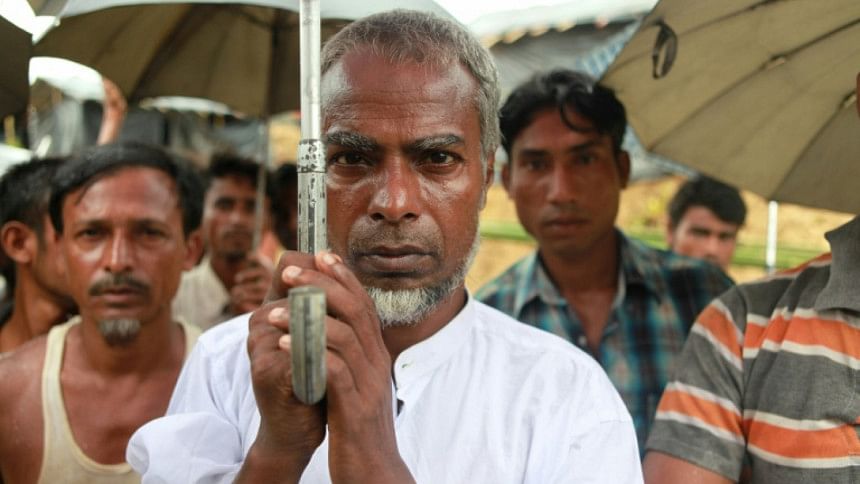
Myanmar soldiers barred the entrance to the mosque, men arrived with machetes and petrol cans and then, according to Rohingya Muslim eyewitnesses, the killing began.
"Those that ran were hacked to death. Others that got away were shot by the army," said Master Kamal, a 53-year-old teacher, and one of the survivors of the massacre in Aung Sit Pyin in Myanmar's Rakhine state.
"They were burning houses. We fled to save our lives."
Kamal told AFP he saw three neighbours -- including a father and son -- butchered as he fled, making a 10-day trek across monsoon-drenched hills, rivers and fields to Bangladesh.
Interviews with about 10 people from the village who found refuge at Balukhali camp in Bangladesh revealed horrific details of the events in Aung Sit Pyin on August 25.
That was the day Rohingya Muslim militants attacked police posts across Rakhine, sparking a violent crackdown that has so far driven almost 300,000 of Myanmar's 1.1 million Rohingya population across the border.
The stateless Muslim minority blames Myanmar's army and Buddhist mobs for the widespread killings.
The testimony is difficult to verify because access to Rakhine is heavily restricted.
Myanmar's government has blamed Rohingya militants for the atrocities, including firebombing their own villages and killing civilians suspected of collaborating with the army.
'Everything was burning'
Mohammad Amin, a 66-year-old farmer whose father was a village chief, said his family had lived in Aung Sit Pyin for three generations.
"This is the first time we have fled. I have never witnessed violence like this," said the wiry farmer, wrapped in a tattered blue sarong in a mud-splattered Balukhali shanty.
When the shooting began he ran into the jungle to hide, saying he crossed a river to avoid soldiers pursuing civilians.
Families scattered. Amin spent days searching for his seven sons and daughters in the brush, dodging military patrols.
"From the other side of the river, I could see everything burning," he said.
Myanmar's army says at least 400 people, mainly militants, have been killed in the violence.
But there are fears that figure is underestimated, with other Rakhine villages also the target of alleged massacres.
Many of the refugees from Aung Sit Pyin reported seeing people slaughtered, or passing corpses cut down or burned as they sprinted in all directions from advancing forces.
Twenty-six families who made it out are now cramped underneath a large tarpaulin sheet in a muddy field behind Balukhali. There are no toilets nor clean water.
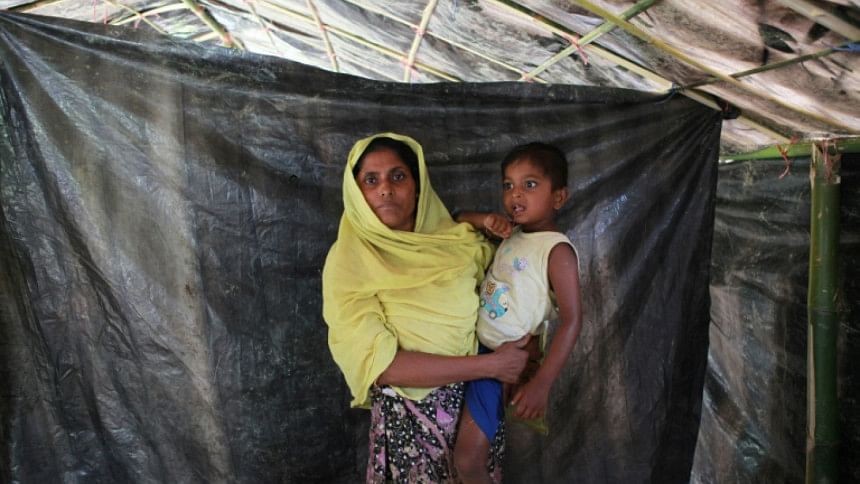
Some said the journey took seven days. Others said they spent up to 12 days hiding from the military and tackling steep passes and rain-soaked jungle to reach Bangladesh.
Anwara Begum said she plunged into a river with her four-year-old son, as soldiers fired at fleeing villagers.
She clung to debris but lost contact with her other five children in the chaos, saying she hid terrified in the hills while helicopters buzzed overhead.
"I thought I would never see them again," the 35-year-old told AFP.
Her other five children aged 12 to 19 linked up with their father at the border and the family was reunited in Bangladesh, she said.
Others have been less fortunate.
Nearly 100 people have drowned trying to cross the Naf river on the border, their bodies washing up on the shore.
Others have arrived bearing injuries consistent with bullet wounds, or missing limbs from alleged landmines placed to deter evacuees from returning.
'I thought I would die'
The sprawling camps inside Bangladesh have swelled with newcomers like Jamal Hussain, 12, who said his five older brothers were cut down by machine gun fire in Aung Sit Pyin as they ran. He has not seen his parents or seven sisters since.
"We were all together but suddenly they started firing. I could not look back, because I thought I would die," the softly-spoken boy said.
"When I was hiding, I remembered the whole thing. I started crying."
On his shoulder was a welt and scar the size of a small coin, evidence of the splinter of shrapnel or bullet that he said struck his back and passed through.
"At first I didn't know what happened, then people behind were saying there was blood on my back," he said.
Myanmar considers the Rohingya illegal migrants from Bangladesh and denies them citizenship, even though many have lived in Rakhine for generations.
Pressure is mounting on de-facto leader and Nobel peace laureate Aung Sung Suu Kyi to end the violence.
Impoverished Bangladesh has been overwhelmed by the influx of hundreds of thousands of Rohingya in the last two years.
For those squatting in the mud in Balukhali there is nowhere left to go.
Taking solace under a plastic sheet, mother of six Begum said she was prepared to "beg" for a living.
"If I have nothing to eat, I will eat soil, but I will never go back."

 For all latest news, follow The Daily Star's Google News channel.
For all latest news, follow The Daily Star's Google News channel. 

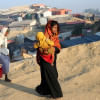
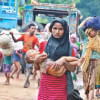
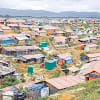
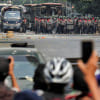
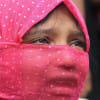


Comments